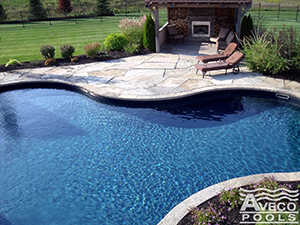Deliberating the Pros and Cons of Vinyl Pool Construction and Fiberglass Pools
When making a major investment in their home or property, homeowners will often face some challenging decisions.
Although the ultimate purpose/use of that expenditure may be clearly defined, there are usually several options from which to choose, each having merits and detriments, and that can complicate matters before a final purchase is made.
For example – all garage doors offer privacy and security but there are numerous styles available; all roofs provide protection but homeowners can choose from many different materials; and all cars can get people from one place to another yet there is a plethora of makes and models on the market.
The same notion applies to an investment in an in-ground swimming pool;
while all pools can be refreshing and afford a source of relaxation, exercise, and/or entertainment, they are not all the same in their styles and composition.
Therefore, in an effort to assist any homeowners who may be deliberating over the specific type of pool construction for their backyard, the ensuing comparison is presented, with a focus on the differences between vinyl pools and fiberglass pools.
Pros and Cons – Vinyl Pool Construction
- Lowest in initial cost
- Fastest installation time
- Smooth, non-abrasive surface
- Customizable – size, shape, design
- Non-porous – resistant to algae growth
- Available in several patterns and colours
- Less maintenance (requires fewer chemicals)
- Vinyl liner will need replacement every few years
- Exposure to pool chemicals/sunlight can cause fading
- Some types of liner damage not covered under warranty
Pros and Cons – Fiberglass Pool Construction
- Pre-cast – relatively quick to install
- Pre-molded steps/seats often included
- Non-porous surface – resistant to algae
- Available in a wide range of colour finishes
- Lower maintenance costs over the long-term
- More resistant to bleaching or fading over time
- Can increase resale value of the home/property
- Initial installation costs are higher
- Depth, width, shape are more constrained
- May need weekly cleaning/chemicals to protect finish
There are certainly some strong arguments in favour of both vinyl pool construction and a fiberglass pool.
Home owners are encouraged to thoroughly research these types of pools to determine which composition makes the most sense for their property, for their budget, and for the primary use of the pool/the objective behind its installation.
Why Vinyl Liner Replacement is Inevitable with this Type of Pool Construction
As mentioned above, in-ground pools of vinyl construction will need a liner replacement every few years;
the average lifecycle of a vinyl liner is generally accepted to be 8 to 12 years.
Some of the common indicators that a liner replacement is imminent will include:
- Simple aging and wear-and-tear
- Fading of the colour and/or pattern
- Leaks – water level cannot be maintained
- Loss of resilience – persistent wrinkling or sagging
- Inability to properly repair a noticeable gash or tear
- Accidental damage by pool users or the forces of nature
For more than 30 years, Aveco Pools has been installing and replacing vinyl liners for in-ground swimming pools.
The experienced and trained team at Aveco Pools understands the importance of proper initial installation and subsequent maintenance of a vinyl liner in order to maximize its service life and deliver the best possible return on investment.
See our
Vinyl Pool Renovations page
for more insight on the vinyl pool construction and vinyl liner replacement services offered by Aveco Pools.
Considering the installation of an in-ground swimming pool for your backyard this year?
Call the pool construction professionals from Aveco Pools today at 905-640-2666 or contact us for to discuss the merits of vinyl construction and fiberglass pools, and to obtain a free estimate on the composition and design that best fits your needs and the size/shape of your property.

